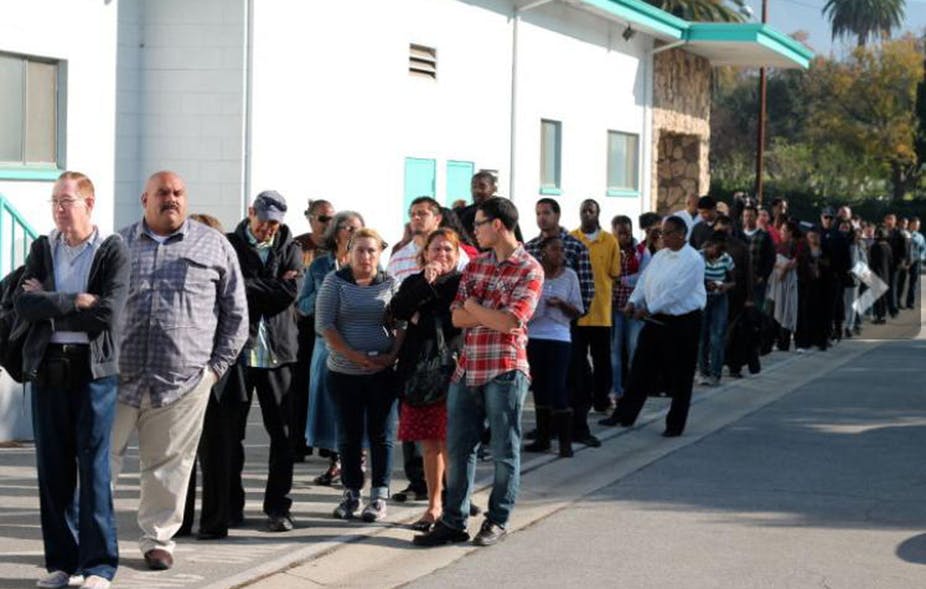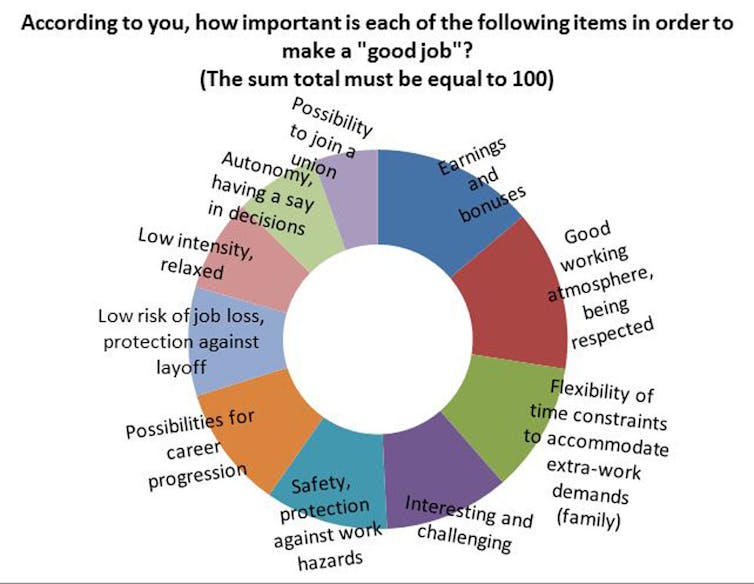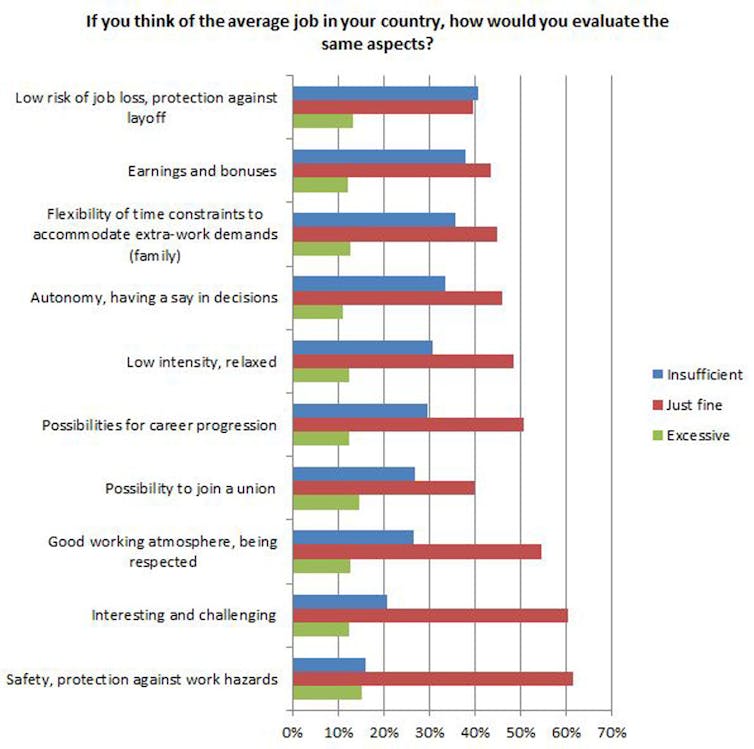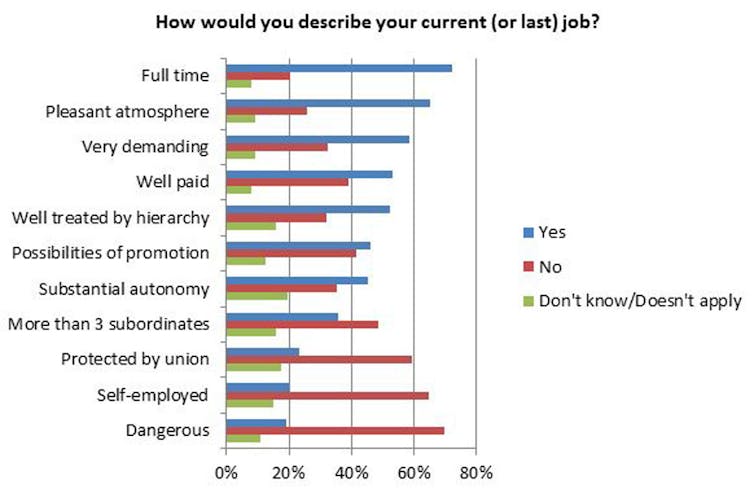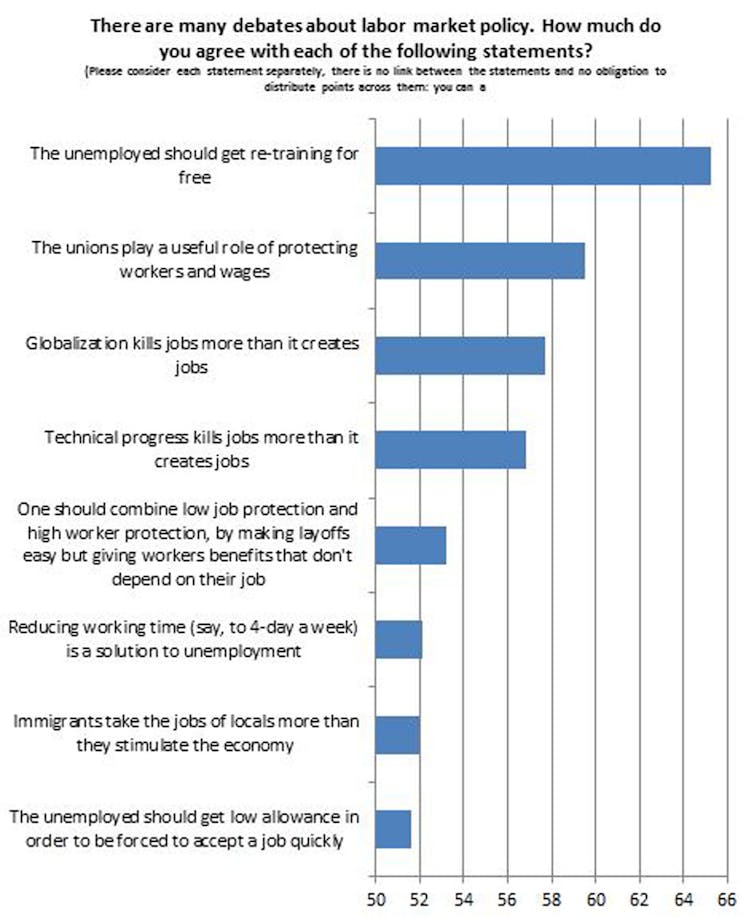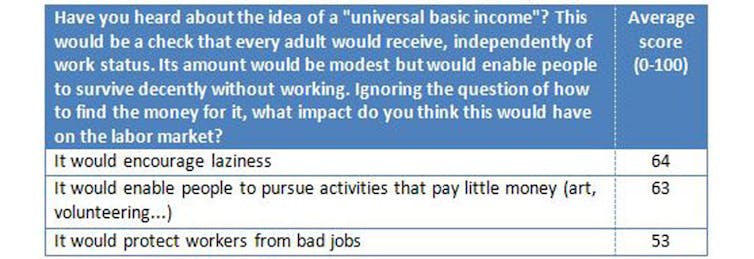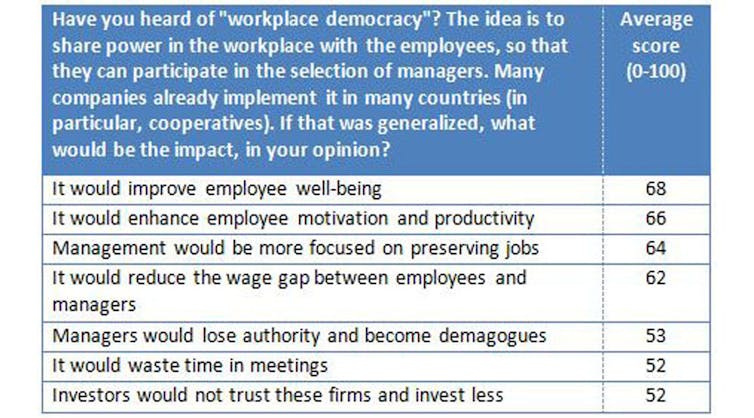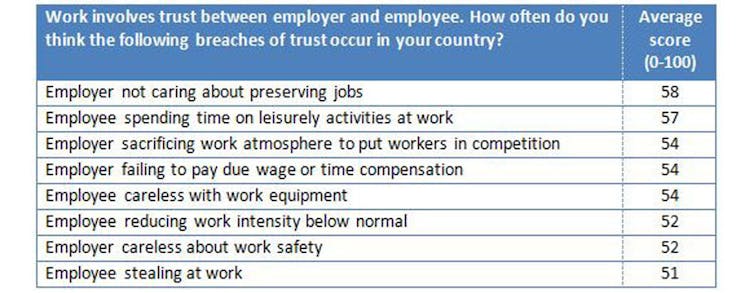The labor market in the US is quite different from most European countries, with less protection for workers, and stagnant wages for several decades, leading some analysts to declare that the “American dream” is dead. The current positive numbers about unemployment hide a high rate of discouraged workers who have ceased to look for a job, as shown in the declining participation to the labor market. How do American workers think about their jobs and how would they imagine an improvement of their condition?
The report of the International Panel on Social Progress proposes a list of criteria for a “good job.” In April 2017, the IPSP conducted a survey on an Internet sample of 1,037 individuals representative of the age and race composition of the adult population in the United States, asking them what makes a job good.
The order of importance of the criteria, in the respondents" opinion, has money and atmosphere first, which are two very different and complementary criteria. Autonomy, unionization, protection against hazards or layoffs are less of a priority.
Author provided
Women put less weight than men on earnings, career progression, autonomy, job protection and unions, but more on flexibility for extra-work demands. Elderly respondents put more weight than average on earnings, atmosphere, interest and safety. Non-white respondents put more weight than whites on unionization. Educated respondents put more weight on extra-work flexibility.
Job protection comes at the seventh rank in the above list of ten criteria. However, when asked how the situation could be improved in the US labor market institutions, protection against layoffs comes first, even before wages, which is remarkable given the stagnation of wages in the US for several decades. Unionization, in contrast, remains low in the list of priorities for improvement. It is also interesting to see that autonomy, low in the criteria for a good job, is high in the priorities for improvement.
Young, rich or religious respondents tend in general to be more positive about the situation, while women are more negative.
Author provided
This was about the US market in general. Asked the same question about their own job, it is first striking that the share of people opting for “insufficient” is on average ten points below what it was for the general market. People are less dissatisfied with their own situation than with what they perceive as the national situation. The order of criteria is also surprising. Now, earnings come at the top, whereas protection against layoffs recedes to the bottom of the list, but the possibility to join a union moves up.
Good atmosphere, interesting and challenging, and safety against hazards remain at the bottom, with high rates of satisfaction both for the general situation and the personal situation.
Author provided
Additional questions further probe how people describe the characteristics of their job and their labor history. It is noticeable that less than 30% find the atmosphere unpleasant at work, and that a majority find their job well paid. Almost two-thirds of the sample have been through unemployment, and more than a third have been self-employed.
Men, high earners, educated respondents are more satisfied with their pay. Religious respondents are more satisfied than average about almost every aspect. Non-white or progressive respondents are more positive about promotion, like high earners.
Author provided
Author provided
Asked about various ideas regarding the labor market institutions and trends, the respondents are strongly in favor of free retraining, which is surprising because this idea is not discussed much. They also like the action of unions, in spite of not putting them high in the list of criteria for good jobs and improving reforms. Globalization and technology are considered guilty of killing jobs more than immigrants (for the record: the impact of technology on job destruction is considered by experts to be much more important than trade and the impact of immigration is roughly neutral).
Author provided
Women are less supportive of the statements about globalization, technology and immigrants, as well as flexicurity (protecting workers not jobs) and incentivizing the unemployed. The young give lower backing to free retraining and more to flexicurity and incentivizing the unemployed. The non-white support unions, retraining and flexicurity more than the whites. The high-income respondents support flexicurity and incentives for the unemployed. The more educated respondents give less support than average to the statements about technology and immigrants. The progressive respondents give less support than average to the statements about globalization and immigrants, but more for retraining, unions and flexicurity.
In the IPSP report, two reforms affecting the labor market are proposed as worth experimenting with: the universal basic income and workplace democracy. We have already reported that Americans do not support the idea of universal basic income very much. The effects of a basic income on the labor market are debated, and the sample endorses a negative assessment about incentives, although it also thinks that it may open a space for activities with low market value.
Author provided
Laziness is a greater concern for male, white, educated, conservative or religious respondents. Enabling low market value activities and protecting workers from bad jobs is envisioned less by white or elderly respondents but more by educated or progressive respondents.
In contrast to the basic income, workplace democracy appears to be viewed more positively, since the positive aspects find more support than the negative.
Author provided
This state of the opinion about workplace democracy resonates with Elizabeth Warren’s recent proposal for an Accountable Capitalism Act which, among other things, would give 40% of the seats of company boards to representatives of workers. It also corroborates our results about reforming the distribution of power in companies, obtained on a different sample and published in a previous post.
Finally, when asked about misdeeds of employers and employees, there is not a big difference between the various possible items in the table, though it is interesting that job security is again an important one here. Strikingly, the progressives put more blame on employers than employees, whereas the very religious think that misdeeds on both sides happen more often than the average respondent.
Pariroo Rattan has helped with analysing the results.

This post belongs to a series of contributions coming from the International Panel on Social Progress, a global academic initiative of more than 300 scholars from all social sciences and the humanities who have prepared a report on the perspectives for social progress in the 21st Century.



 Parents abused by their children often suffer in silence – specialist therapy is helping them find a voice
Parents abused by their children often suffer in silence – specialist therapy is helping them find a voice  What’s the difference between baking powder and baking soda? It’s subtle, but significant
What’s the difference between baking powder and baking soda? It’s subtle, but significant  Why financial hardship is more likely if you’re disabled or sick
Why financial hardship is more likely if you’re disabled or sick  The Beauty Beneath the Expressway: A Journey from Self to Service
The Beauty Beneath the Expressway: A Journey from Self to Service  How to support someone who is grieving: five research-backed strategies
How to support someone who is grieving: five research-backed strategies  AI is driving down the price of knowledge – universities have to rethink what they offer
AI is driving down the price of knowledge – universities have to rethink what they offer  Yes, government influences wages – but not just in the way you might think
Yes, government influences wages – but not just in the way you might think  Office design isn’t keeping up with post-COVID work styles - here’s what workers really want
Office design isn’t keeping up with post-COVID work styles - here’s what workers really want  Stuck in a creativity slump at work? Here are some surprising ways to get your spark back
Stuck in a creativity slump at work? Here are some surprising ways to get your spark back 










